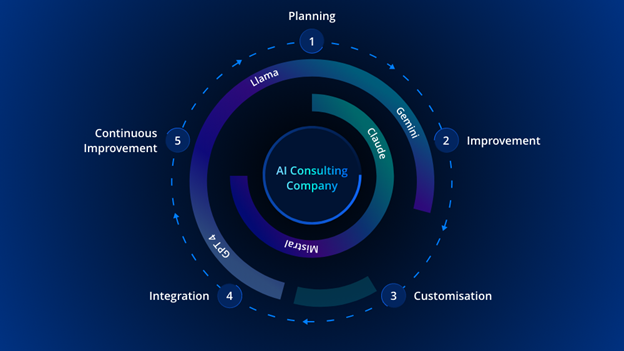Artificial Intelligence (AI) is transforming various industries by offering innovative solutions and enhancing operational efficiency. This article explores several AI use cases and applications across different sectors and highlights how businesses can benefit from these advancements.
Healthcare
AI is revolutionizing healthcare by improving diagnostics, personalizing treatment plans, and enhancing patient care. These technologies help medical professionals make more accurate decisions and provide better outcomes for patients.
Key Applications:
- Medical Imaging: AI algorithms analyze medical images, such as X-rays and MRIs, to detect anomalies and diagnose diseases with high accuracy.
- Personalized Treatment: AI tailors treatment plans based on individual patient data, improving the effectiveness of therapies.
- Predictive Analytics: AI predicts patient outcomes and potential health risks, allowing for proactive interventions.
Finance
In the finance industry, AI enhances decision-making, optimizes trading strategies, and improves customer service. Financial institutions leverage AI to gain a competitive edge and better serve their clients.
Key Applications:
- Fraud Detection: AI analyzes transaction patterns to detect and prevent fraudulent activities in real time.
- Algorithmic Trading: AI-powered algorithms execute trades at optimal times, maximizing returns and minimizing risks.
- Customer Service: AI chatbots provide instant support and personalized financial advice to customers.
Retail
AI transforms the retail sector by optimizing supply chain management, enhancing customer experiences, and personalizing marketing efforts. Retailers use AI to streamline operations and boost sales.
Key Applications:
- Inventory Management: AI predicts demand and manages stock levels, reducing costs and preventing stockouts.
- Personalized Recommendations: AI analyzes customer behavior to recommend products that match their preferences, increasing sales.
- Dynamic Pricing: AI adjusts prices in real-time based on demand, competition, and market trends.
Manufacturing
AI improves manufacturing processes by enhancing quality control, predictive maintenance, and production efficiency. These applications help manufacturers reduce costs and increase productivity.
Key Applications:
- Quality Control: AI inspects products for defects and ensures they meet quality standards.
- Predictive Maintenance: AI predicts equipment failures and schedules maintenance, minimizing downtime and extending machinery lifespan.
- Process Optimization: AI analyzes production data to identify inefficiencies and optimize workflows.
Partnering with an AI Development Company
To effectively implement AI technologies, businesses often collaborate with an AI development company. These companies offer expertise in AI solutions and ensure seamless integration and optimal performance.
Benefits of Collaboration:
- Expertise: Access to AI specialists with deep knowledge of industry-specific applications.
- Customized Solutions: Tailored AI solutions designed to address specific business challenges and goals.
- Scalability: AI solutions that scale to support growing data volumes and business requirements.
Conclusion
AI is transforming industries by offering innovative solutions and enhancing operational efficiency. By leveraging AI technologies and partnering with an AI development company, businesses can achieve significant advancements in their operations and competitive edge. As AI continues to evolve, its impact on various sectors will expand, shaping the future of industries and driving innovation.











Leave a Reply